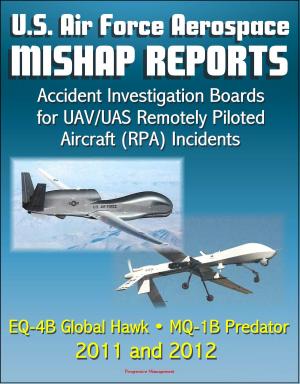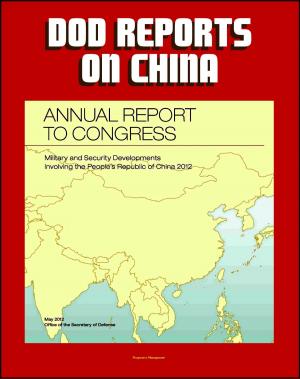21st Century U.S. Military Documents: Operations Security (OPSEC) Air Force Instruction 10-701 - Signature Management, Analyze Threats, Education and Training
Nonfiction, History, Military, Aviation| Author: | Progressive Management | ISBN: | 9781301279180 |
| Publisher: | Progressive Management | Publication: | October 13, 2013 |
| Imprint: | Smashwords Edition | Language: | English |
| Author: | Progressive Management |
| ISBN: | 9781301279180 |
| Publisher: | Progressive Management |
| Publication: | October 13, 2013 |
| Imprint: | Smashwords Edition |
| Language: | English |
OPSEC is a military capability within Information Operations (IO). IO is the integrated employment of three operational elements: influence operations (IFO), electronic warfare operations and network warfare operations. IO aims to influence, disrupt, corrupt, or usurp adversarial human or automated decision-making while protecting our own. IFO employs the military capabilities of military information support operations (MISO), OPSEC, military deception (MILDEC), counterintelligence operations, public affairs (PA) operations and counterpropaganda operations to affect behaviors, protect operations, communicate commanders' intent and project accurate information to achieve desired effects across the operational environment. OPSEC's desired effect is to influence the adversary's behavior and actions by protecting friendly operations and activities.
The OPSEC program is an operations function or activity and its goals are information superiority and optimal mission effectiveness. The emphasis is on OPERATIONS and the assurance of effective mission accomplishment. To ensure effective implementation across organizational and functional lines the organization's OPSEC Program Manager (PM), Signature Management Officer (SMO), or coordinator will reside in the operations and/or plans element of an organization or report directly to the commander. For those organizations with no traditional operations or plans element, the commander must decide the most logical area to place management and coordination of the organization's OPSEC program while focusing on operations and the mission of the organization.
Chapter 1 * GENERAL * 1.1. Introduction * 1.2. Operational Context * 1.3. Purpose * 1.4. Roles and Responsibilities * Chapter 2 * SIGNATURE MANAGEMENT * 2.1. Signature Management * 2.2. Wing or installation commanders will * 2.3. Signature Management Officer/Signature Management Non-Commissioned Officer will: * 2.4. Signature Management Planning and Coordination * 2.5. Exploitation Countermeasures (Refer to AFI 10-704, Paragraph 2 * Chapter 3 * OPSEC PLANNING * 3.1. General * 3.2. Operational Planning * 3.3. Support Planning * 3.4. Exercise Planning * 3.5. Acquisition Planning * Chapter 4 * OPSEC PROCESS * 4.1. General * 4.2. Identify Critical Information * 4.3. Analyze Threats * 4.4. Analyze Vulnerabilities * 4.5. Assess Risk * 4.6. Apply Countermeasures * Chapter 5 * OPSEC EDUCATION AND TRAINING * 5.1. General * 5.2. All Personnel * 5.3. OPSEC PMs/SMO/SMNCOs/Coordinators, Planners, Inspection Teams * 5.4. Joint and Interagency OSPEC Support * Chapter 6 * ASSESSMENTS * 6.1. General * 6.2. Annual OPSEC Program Review * 6.3. Staff Assistance Visit (SAV) * 6.4. Survey * 6.5. Web Content Vulnerability Analysis * 6.6. Support Capabilities * Chapter 7 * AIR FORCE OPSEC ANNUAL AWARDS PROGRAM * 7.1. General * Chapter 8 * OPSEC REQUIREMENTS WITHIN CONTRACTS * 8.1. General * 8.2. Guidance and procedures * Attachment 1 * GLOSSARY OF REFERENCES
OPSEC is a military capability within Information Operations (IO). IO is the integrated employment of three operational elements: influence operations (IFO), electronic warfare operations and network warfare operations. IO aims to influence, disrupt, corrupt, or usurp adversarial human or automated decision-making while protecting our own. IFO employs the military capabilities of military information support operations (MISO), OPSEC, military deception (MILDEC), counterintelligence operations, public affairs (PA) operations and counterpropaganda operations to affect behaviors, protect operations, communicate commanders' intent and project accurate information to achieve desired effects across the operational environment. OPSEC's desired effect is to influence the adversary's behavior and actions by protecting friendly operations and activities.
The OPSEC program is an operations function or activity and its goals are information superiority and optimal mission effectiveness. The emphasis is on OPERATIONS and the assurance of effective mission accomplishment. To ensure effective implementation across organizational and functional lines the organization's OPSEC Program Manager (PM), Signature Management Officer (SMO), or coordinator will reside in the operations and/or plans element of an organization or report directly to the commander. For those organizations with no traditional operations or plans element, the commander must decide the most logical area to place management and coordination of the organization's OPSEC program while focusing on operations and the mission of the organization.
Chapter 1 * GENERAL * 1.1. Introduction * 1.2. Operational Context * 1.3. Purpose * 1.4. Roles and Responsibilities * Chapter 2 * SIGNATURE MANAGEMENT * 2.1. Signature Management * 2.2. Wing or installation commanders will * 2.3. Signature Management Officer/Signature Management Non-Commissioned Officer will: * 2.4. Signature Management Planning and Coordination * 2.5. Exploitation Countermeasures (Refer to AFI 10-704, Paragraph 2 * Chapter 3 * OPSEC PLANNING * 3.1. General * 3.2. Operational Planning * 3.3. Support Planning * 3.4. Exercise Planning * 3.5. Acquisition Planning * Chapter 4 * OPSEC PROCESS * 4.1. General * 4.2. Identify Critical Information * 4.3. Analyze Threats * 4.4. Analyze Vulnerabilities * 4.5. Assess Risk * 4.6. Apply Countermeasures * Chapter 5 * OPSEC EDUCATION AND TRAINING * 5.1. General * 5.2. All Personnel * 5.3. OPSEC PMs/SMO/SMNCOs/Coordinators, Planners, Inspection Teams * 5.4. Joint and Interagency OSPEC Support * Chapter 6 * ASSESSMENTS * 6.1. General * 6.2. Annual OPSEC Program Review * 6.3. Staff Assistance Visit (SAV) * 6.4. Survey * 6.5. Web Content Vulnerability Analysis * 6.6. Support Capabilities * Chapter 7 * AIR FORCE OPSEC ANNUAL AWARDS PROGRAM * 7.1. General * Chapter 8 * OPSEC REQUIREMENTS WITHIN CONTRACTS * 8.1. General * 8.2. Guidance and procedures * Attachment 1 * GLOSSARY OF REFERENCES















